- Home
- German Holidays and Customs
Celebrating the German Way: More Than Just Beer and Bratwurst
By: Lydia Fulson / Writer, Pyrography Artist, Thrill Seeker, and Traveler
Published: April 15, 2023 | Updated: February 26, 2025
Ahh, the holidays. There's nothing quite like them. A time for dancing and singing, whether it be "We wish you a Merry Christmas, or "Happy Birthday to You!"; there's always jolly fun to be had. To accompany the fun sing-alongs are tasty foods. Keep scrolling to learn about the yummy goodness served during different German holidays and customs. There are some, that aren't that common, such as Epiphany.
But best of all, the holidays are an opportunity to see the family. Maybe even distant family members that are missed so often throughout the year. Catch up in conversation with a hot mug of Glühwein (German mulled wine) or a classic Kaffeeklatsch. Aha! There's our first German tradition to learn about.

On this page:
Kaffeeklatsch
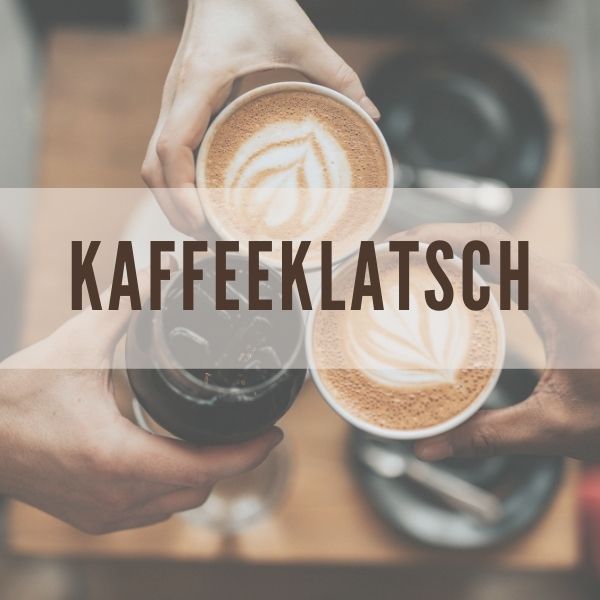
Perhaps this is one of those new traditions you've never heard before. So let's start with what it actually means.
To someone who may not speak a lick of German, the word may look a little crazy. But when you break it down, what does the first part, "Kaffee" sound like? Yep, Coffee! Yum!
Translation: A social gathering for chit-chat over coffee
Kaffeeklatsch isn't full of common holiday traditions like Christmas time. It's more of a fun, sentimental time to catch up with old friends and family over a cappuccino! (Or whatever you're feeling like that day) :) It's nothing fancy! No need for preparation of big feasts and festivities. Simply pop a coffee pod or ground coffee in the coffee maker and talk away.
In German culture, it's common to meet at local cafés and coffee shops instead of the home. While touring Germany, you'll see loads of folks enjoying social time over a steamy mug. No pressure, no stress. Enjoy a tasty beverage and marzipan-filled snacks, and have a good visit. Maybe some shopping afterward?
Christmas in Germany
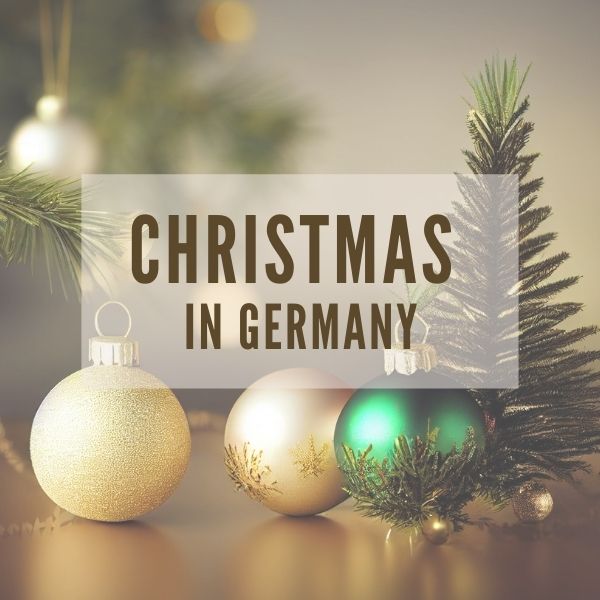
When it comes to German Christmas traditions, there's more to it than the Christmas tree and gifts. Of course, those are a part of the holiday season, and we'll talk about them too!
But this national holiday has some very interesting customs celebrated across the German states. Get ready for a wild ride of wacky customs.
We are coming in hot with the Christmas pickle tradition. Out of all the traditions, this one takes the cake for being one of the oddest. Going off the Christmas tree mentioned earlier, here's a new tradition to try out this year with the kids.
The Christmas pickle tradition is not originally a German one, but an American one. Its raving popularity spread across Europe, and now families in Germany embrace the newfound fun.
As this new tradition goes, parents would hide the pickle ornament somewhere on the Christmas tree (Weihnachtsbaum) and the kids would have to try and be the first to find it. Why? The child to find the pickle first gets to open a Christmas present early. Now that's a good deal. What child would pass on that?
Unusual, indeed. But what a great way to gather everyone for a light-hearted and super fun family activity before the big celebration. The Christmas pickle is such a fun tradition to add to your holiday to-dos.
The celebrations continue with Christmas carols and blissful Christmas markets full of tasty treats, like lecker Stollen, decorations, and more to make the most festive season as special as can be.
Those markets are a whole amazing thing in themselves. One can go on and on about the wunderbar festivities leading up to Christmas Day, but we have so many great German holidays and customs to cover!
See Eran's post on Christmas Eve in Germany for more festive traditions and cultural curiosities.
St. Nicholas Day
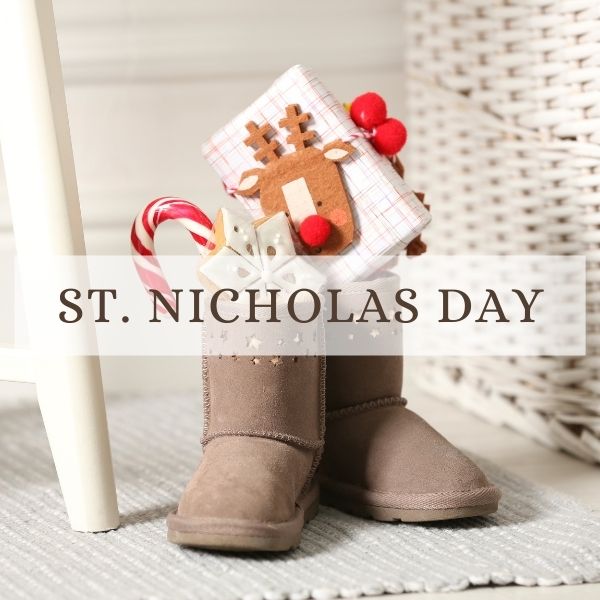
St. Nicholas, otherwise known as Nikolaus, the gift giver, has been a special part of kicking off the Christmas season. December 6th is the day that kids all around Germany wait for. The excitement bubbles up as they wait for Saint Nikolaus to come. But why?
The whole purpose of the day is to show how giving the holiday season can be. After all, Christmas is the time to give. Every year on the night of the 5th, children will leave a shoe or boot outside their door, and in the morning, they will be full of chocolates, clementines, and a small gift.
Another tradition is that “St. Nick” will also leave a funny joke or riddle in the shoe. The kids look forward to swapping riddles and sharing their treats and excitement because they got that special visit!
German Unity Day
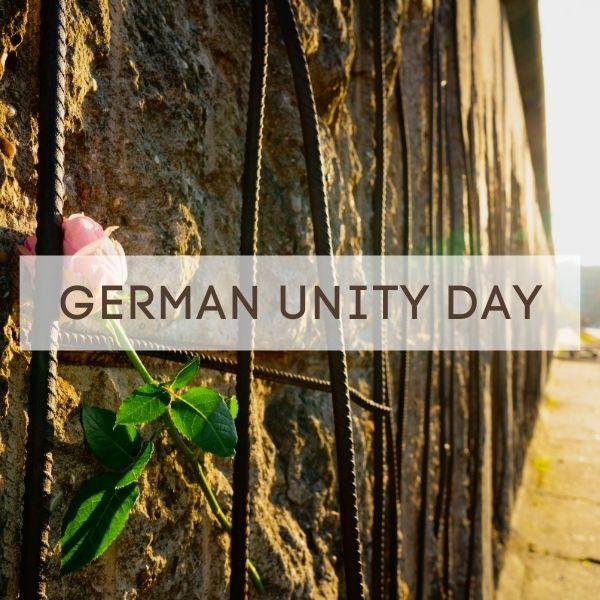
The Tag der Deutschen Einheit (I know, so easy to pronounce) is celebrated every year on October 3rd. This day marks the honoring and victory of Germany coming together as one, after being separated for so many years after the Second World War. A major part that led to this unity was the fall of the wall.
The Berlin Wall was built to divide Germany's western and eastern people, forming two states. It was a whopping 13 feet high and kept getting longer and stronger throughout its years of standing to divide the country's people.
But one hopeful day, after standing for 28 years, the wall of doom met its match on November 9th, 1989. Well over two million folks from the East and West came together to destroy the ugly symbol of hate. That moment marked the first day that Germany reunited together as one.
October 3rd, Unity Day, was the day chosen to celebrate, not the divide and destruction that war can bring, but the harmony and strength people can have when they share a love for the same thing. And that thing was their beloved Germany!
Valentine's Day

You may be shocked to hear that Valentine's Day in Germany is certainly not as big a deal as it is in other spots around the globe.
The customs are similar, with cards and special notes, but more uncommonly are the chocolates and flowers.
Since it hasn't been known for long, some older generations still haven't warmed up to it yet. It's definitely not as above and beyond in Germany, but it's still recognized as a day to celebrate those you love, and love trumps material things.
For a full breakdown of the most romantic day of the year, check out Eran's post on Valentine's Day in Germany.
All Saints' Day
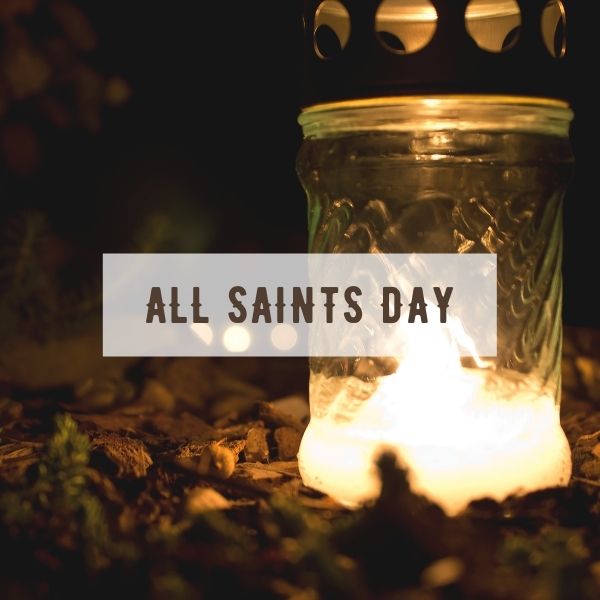
On the topic of love, All Saints' Day is a day to honor and celebrate the lives of deceased loved ones. Parts of Germany have celebrated this day for centuries. Baden-Württemberg, Rhineland-Palatinate, and Saarland are just a handful of Germany's widely Catholic states that celebrate. This day has been celebrated on November 1st since the year 609 AD! Wowza.
Out of respect to those honoring loved ones, banks, stores, cafés, and many other public shops close down for the day. People will gather flowers and candles to decorate the graves and take time to pray, remember and celebrate the time spent together. Perhaps one of the most beautiful of German holidays and customs.
Celebrating Easter
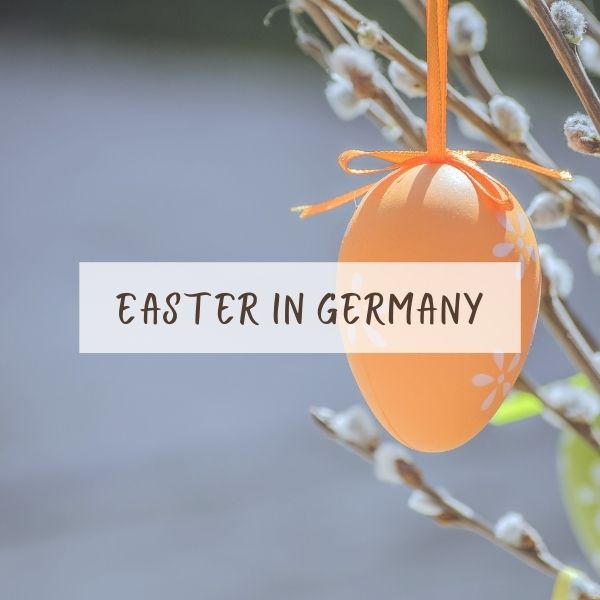
Easter has been a long-time celebrated holiday. It's a blessed time to reflect and enjoy family time.
Easter in Germany is similar to the American-style Easter. Typically, a church service is held on Easter Sunday, and egg hunts play out all day for the youngins.
Easter is such a fun holiday for the whole family. Families paint eggs together, hiding them around and scavenging about. But the best part? Chocolate! Waiting for the Easter bunny the night before is like children waiting on Christmas Eve for Santa. So much fun!
Have you ever seen someone hang decorated Easter eggs in their trees and around the house? This is a common custom in Germany too. A great feast also comes with Easter in Germany. Things like lamb, eggs (of course), dumplings, raisin rolls, and more!
This holiday is full of mouthwatering treats. In fact, most German holidays are. And Germany has some of the best food out there.
German holidays are plentiful, and there's just so much to unpack. With so much history and fun that comes with celebrating holidays, which one's your favorite?
